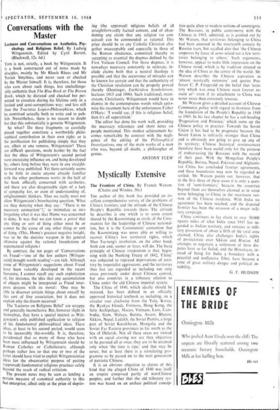Mystically Extensive
The Frontiers of China. By Francis Watson. (Chatto and Windus, 30s.)
THE author of this book has provided an ex- cellent comprehensive survey of the problems of China's frontiers and the attitude of the Chinese People's Republic towards them. The attitude he describes is one which is to some extent shared by the Kuomintang as rivals of the Com- munists for the leadership of Chinese national- ism, but it is the Communists' contention that the Kuomintang was never able or willing to recover China's lost territorial rights, which Mao Tse-tung's revolution, on the other hand, both can and, sooner or later, will do. The basic principle of Chinese irredentism is that, begin- ning with the Nanking Treaty of 1842, 'China' was subjected to repeated deprivations of terri- tory by imperialist aggressions, and the territories thus lost are regarded as including not only areas previously under direct Chinese control, but also countries in a tributary relation to China under the old Chinese imperial system.
The China of 1840, which ideally should be restored, has been defined in an officially approved historical textbook as including, on a circular tour clockwise from the Yalu, Korea, the Ryukyu Islands, Formosa, Hong Kong, the Sulu Archipelago, Macao, Vietnam, Laos, Cam- bodia, Siam, Malaya, Burma, Assam, Bhutan, Sikkim, Nepal, Ladakh, the Soviet Pamirs, a large part of Soviet Kazakhstan, Mongolia and the Soviet Far Eastern provinces as far north as the Sea of Okhotsk. Not all these areas are viewed with an equal craving nor are they objectives to be pursued all at once; they are to be attained only when 'the time is ripe,' and that may be never, but at least there is a stimulating pro- gramme to be passed on to the next generation of patriotic Chinese.
It is an obvious objection to claims of this kind that the alleged China of 1840 was itself an empire composed partly of non-Chinese peoples, and further that the old tributary sys- tem was based on an archaic political concep- tion quite alien to modern notions of sovereignty. The Russians, in public controversy with the Chinese in 1963, admitted, as is pointed out by Mr Watson, that territories belonging to China had been annexed in the nineteenth century by Russian tsars, but recalled also that 'the Chinese emperors by force of arms seized not a few terri- tories belonging to others.' Such arguments, however, appear to make little impression on the Chinese mind, which is by tradition attuned to the idea of China as the centre of the world; Mr Watson describes the Chinese aspiration as `almost mystically extensive' and quotes Pro- fessor C. P. Fitzgerald on the belief that 'terri- tory which was once Chinese must forever re- main so'—even if its attachment to China was never more than extremely tenuous.
Mr Watson gives a detailed account of Chinese Communist policy with regard to frontiers from the foundation of the People's Republic in 1949 to 1965. In his last chapter he has a sub-heading `Pragmatism and Patience,' which sums up the Chinese policy in practice. Towards the Soviet Union it has had to be pragmatic because the Soviet Union is militarily stronger than China and is obviously not going to give up any of its territory; Chinese historical reminiscences therefore have been useful only for the purpose of embarrassing the Russians with the record of their past. With the. Mongolian People's Republic, Burma, Nepal, Pakistan and Afghanis- tan China has concluded frontier agreements, and these boundaries may now be regarded as settled; Mr Watson points out. however, that in the first three of these cases it is only a ques- tion of 'semi-frontiers,' because the countries beyond them are themselves claimed as in some
sense belonging to China in the maximum ver- sion of the Chinese irredenta. With India no agreement has been reached, and the disputed frontier has been the occasion of a major mili- tary campaign.
China continues to lay claim to over 50.000 square miles of what India since 1947 has re- garded as Indian territory, and remains in mili- tary possession of about a fifth of the total area claimed. China also challenges India's rights of protectorate over Sikkim and Bhutan. All attempts to negotiate a settlement of these dis- putes have so far failed, and the Himalayas, in-
stead of being for India a boundary with a peaceful and inoffensive Tibet, have become a zone of great military danger and political in- stability.
G. F. HUDSON


































 Previous page
Previous page